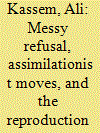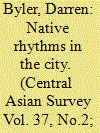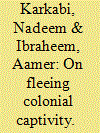| Srl | Item |
| 1 |
ID:
098759


|
|
|
|
|
| Publication |
2010.
|
| Summary/Abstract |
Hezbollah has acquired a dual and contradictory reputation: as a legitimate political actor in Lebanon and as a terrorist organisation in the USA and Israel. This duality can be explained if we understand that Hezbollah is a nationalist entity that defines itself primarily within the Lebanese polity, as well as an anti-imperialist party intent on countering the regional hegemony of Israel and the USA. Forming alliances with Hamas, Iran and Syria, Hezbollah has become part of a 'rejectionist' axis that seeks to oppose perceived imperialism in the Middle East; this stance has become increasingly entrenched in the wake of the 2003 US-led invasion of Iraq. Characterisations that focus on Hezbollah as a military opponent confirm the organisation's perceived need for a rejectionist stance. International acceptance of Hezbollah as a legitimate political actor within the Lebanese polity, on the other hand, would help to bring the basis of the rejectionist axis into question.
|
|
|
|
|
|
|
|
|
|
|
|
|
|
|
|
| 2 |
ID:
192964


|
|
|
|
|
| Summary/Abstract |
visibly Muslim women in Lebanon, a small country on the eastern shores of the Mediterranean, experience significant anti-Muslim racism. Thinking through their anti-racist work, this article identifies and examines a refusal – a pre-emptive move away from power rather than against it that works to make it obsolete and survive despite it. Analysing this movement away, I argue, reveals it as a movement towards a neoliberal ‘civilized’, ‘cultured’, and consumer subject assimilating into Eurocentric modernity/coloniality while surviving in the materiality of its Muslimness. The article accordingly posits this as a form of ‘messy refusal’ – implicated in the cultural and epistemic reproduction of Eurocentric modernity/coloniality – and complexifies refusal’s growing celebration across anti/post/decolonial and indigenous scholarship. In doing this, it contributes to rethinking anti-Islamophobia from the so-called Middle East rather than Euro-America and examining it as a longer process rather than exclusively focusing on the racist moment and site.
|
|
|
|
|
|
|
|
|
|
|
|
|
|
|
|
| 3 |
ID:
159255


|
|
|
|
|
| Summary/Abstract |
Over the past two decades, state-directed Han settlement and capitalist development in the Uyghur homeland in Chinese Central Asia have uprooted thousands of Uyghurs, causing them to move to the city. In this article, I explore how low-income male Uyghur migrants and Uyghur culture producers build a durable existence despite these challenges. Based on analysis of migrant responses to the Uyghur-language urban fiction and indigenous music as well as ethnographic observations of Uyghur migrants from Southern Xinjiang, I argue that indigenous knowledge provides underemployed male Uyghurs a means to refuse the alienating effects of settler colonialism and economic development. By broadening the scope of what counts as ‘resistance’ to Chinese attempts to eliminate aspects of Uyghur society, I show that ‘refusal’ can be a generative way of embodying sovereignty, particularly when confronted by structural violence.
|
|
|
|
|
|
|
|
|
|
|
|
|
|
|
|
| 4 |
ID:
187075


|
|
|
|
|
| Summary/Abstract |
This article examines artistic production in the formerly Syrian land of the Jawlan (Golan Heights) as a way of tracing Indigenous politics of decolonization. Through consideration of the Jawlanis’ longstanding refusal to integrate into the Israeli state, the article demonstrates how Yasser Khanger’s poetry and the music of the band Toot Ard are practices of artistic fugitivity that flee colonial captivity. It argues that these cases offer two different modes of metaphoric and actual fugitive mobility. Khanger’s is a mental movement toward disengagement from the settler-colonial state while physically staying in place. It evades subjugation by redefining confinement as a tool for staging poetic insurgency. The second mode is based on physical nomadic movement in international space while embracing a stateless condition. Fugitivity here becomes a movement that forces the Indigenous stateless self into the outside world, to realise the possibility of decolonisation by transgressing nation-state borders.
|
|
|
|
|
|
|
|
|
|
|
|
|
|
|
|
| 5 |
ID:
192198


|
|
|
|
|
| Summary/Abstract |
The article attempts to empirically identify how the concept of Indigenous refusal helps us understand growing Palestinian political discourse and practices. It aims to develop Critical Indigenous Studies’ potentialities vis à vis the study of historic Palestine. The article puts a particular emphasis on new visions of Palestinian resistance that take aim at the different ways the Global North has tried to impose specific models and narratives on the Palestinian cause through liberal politics of recognition. Those spatio-political arrangements are enmeshed in the so-called ‘Oslo paradigm’ but also concern the portrayal of Israel as a liberal multicultural society, as well as the neoliberal dynamics that continuously shape the different fragments of the Palestinian people. In this regard, Indigenous Palestinian refusal also presents an international dimension that has progressively led to the articulation of anti-racist, anti-imperialist, and anti-capitalist imaginaries that would contribute to shaping radical Palestinian – and transnational – futures.
|
|
|
|
|
|
|
|
|
|
|
|
|
|
|
|
| 6 |
ID:
184065


|
|
|
|
|
| Summary/Abstract |
This article explores an intriguing emergent organising strategy among women of colour activists in London and Amsterdam: a politics of refusal. In response to the triple catastrophes facing women of colour: the on-going roll back of social welfare states, the normalisation of the far right in everyday life and the xenophobic backlash against migrants, we find that some women of colour activists are deliberatively withdrawing from view and working outside of dominant left activist spaces. Rather than demanding recognition and rights from institutional actors and supposed allies, many activists appeared to welcome and embrace their marginalisation as this exclusion from mainstream life creates the possiblity for alternative ways of doing politics and being political. Drawing on the work of Audra Simpson, we attempt to map the contours of women of colour’s refusal politics and consider how refusal generates different approaches to sovergenity and ungovernability.
|
|
|
|
|
|
|
|
|
|
|
|
|
|
|
|